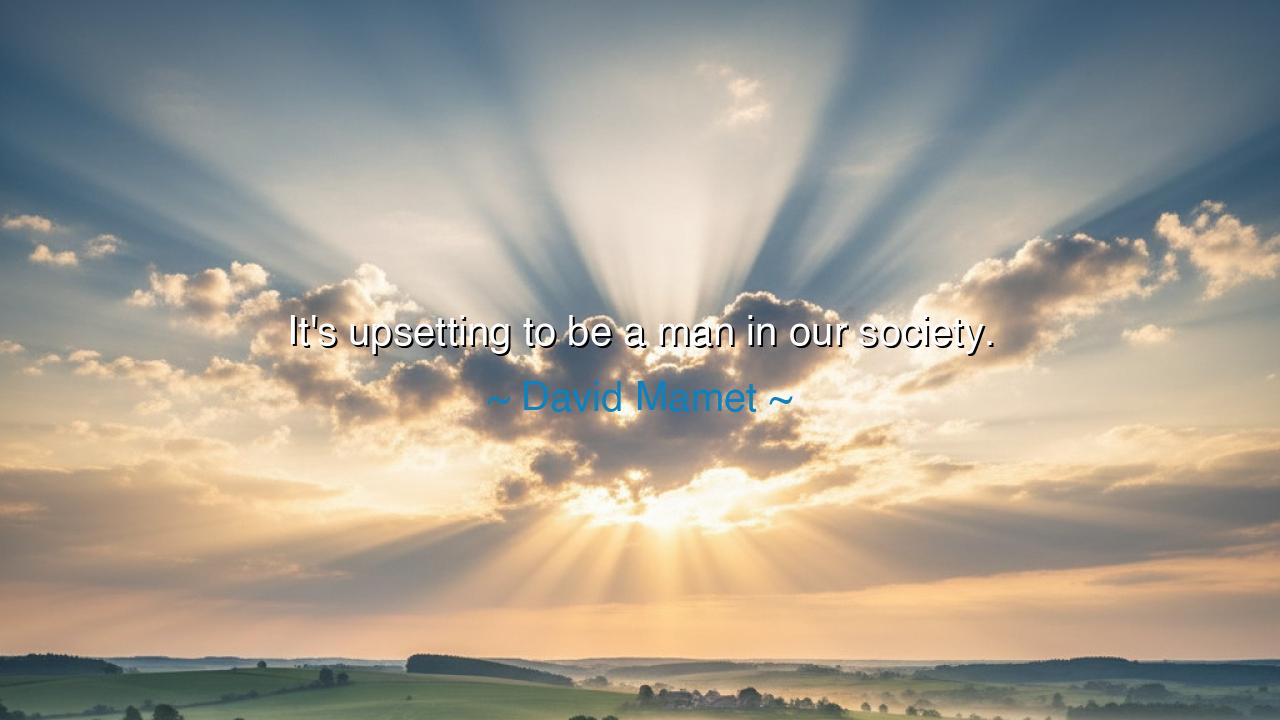
It's upsetting to be a man in our society.






David Mamet, the playwright who stripped bare the illusions of men with his sharp and unsettling dramas, once confessed: “It’s upsetting to be a man in our society.” These words, though brief, carry the heaviness of an age-old struggle. They do not cry for pity but reveal the confusion and conflict of identity in a world that both exalts and condemns manhood. Mamet, whose characters often wrestled with pride, failure, and survival, spoke from the depths of observation: that to be a man in modern times is to walk a road riddled with expectation, contradiction, and unease.
The meaning of this statement lies in the tension between image and reality. Society places upon men masks of strength, control, and invulnerability, demanding that they carry burdens without complaint. Yet within, men too are fragile, uncertain, and longing for meaning. This dissonance breeds upsetting turmoil: to be told one must dominate while yearning to nurture, to be ordered to repress emotions while needing to express them, to be judged by achievement while fearing failure. Mamet’s words echo the lament of countless men across centuries who have felt crushed by their role.
History gives us many reflections of this truth. In ancient Sparta, boys were raised from childhood to be warriors, stripped of comfort, trained only to fight and endure pain. To falter was shameful, to show weakness unthinkable. The men of Sparta fulfilled the ideal their society demanded—but how many hearts broke beneath the armor? How many souls yearned for tenderness but could never show it? Even in their glory, they bore the same truth Mamet names: that manhood, defined only by strength and conquest, is upsetting, for it denies half the soul.
In modern times we see another mirror in the lives of veterans returning from war. Trained to be stoic, hardened, and relentless, many find themselves broken when placed back into a society that does not understand their suffering. They are praised as heroes yet left alone in silence, unable to share their grief for fear of seeming weak. Their plight reveals again the wound of manhood shaped only by expectation: the upsetting distance between what society demands and what the human heart requires.
Mamet’s observation is not condemnation but revelation. He shows us that men too are bound in chains—not only of responsibility, but of image. To admit that it is “upsetting” to be a man is to break the silence, to confess that roles carved by tradition and culture do not always serve the truth of the individual. And in this confession lies a hidden strength, for only by naming the wound can one begin to heal it.
The lesson for us is not merely about men, but about humanity. For every label—man, woman, leader, servant—when hardened into absolute form, becomes a prison. The duty of a wise society is not to discard roles altogether, but to allow them to bend, to breathe, to grow with compassion. A man must be free not only to fight, but to feel; not only to provide, but to dream; not only to endure, but to break and rise again. Only then does the role serve the person, rather than the person serving the role.
Practical action begins with courage. Men must dare to be honest with themselves, to admit fear, sorrow, or tenderness without shame. Families must teach their sons that strength and kindness are not opposites but companions. Communities must listen, truly listen, when men speak of their struggles, instead of silencing them with “be strong.” And all of us must remember that the measure of manhood is not the absence of weakness, but the presence of integrity.
Thus let Mamet’s words echo not as despair, but as call: “It’s upsetting to be a man in our society.” Hear them, and let them stir change. For when men are freed from the burden of masks, when they are allowed to be whole—both strong and tender, both proud and vulnerable—then society itself is healed. And from that healing arises a future where no one need feel upset by their role, but may instead live as they truly are: human, unbound, and fully alive.






AAdministratorAdministrator
Welcome, honored guests. Please leave a comment, we will respond soon